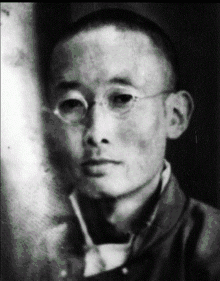Gendün Chöphel
Gendun Chompel, Gendün Chöphel (Tibetan: དགེ་འདུན་ཆོས་འཕེལ།, Wylie: dge 'dun chos 'phel )[1] (1903–1951) was a Tibetan scholar, thinker, writer, poet, linguist, and artist. He was born in 1903 in Shompongshe, Rebkong, Amdo. He was a creative and controversial figure and he is considered by many to have been one of the most important Tibetan intellectuals of the twentieth century.

Gendün Chöphel was a friend of Rahul Sankrityayan. His life was the inspiration for Luc Schaedler's film The Angry Monk: Reflections on Tibet.[2] He is best known for his collection of essays called The Madman's Middle Way: Reflections on Reality of the Tibetan Monk Gendun Chophel.[3] and Grains of Gold: Tales of a Cosmopolitan Pilgrimage, written during his time in India and Sri Lanka in between 1934 and 1946. These essays were critical of modern Hinduism, Christianity, and British imperialism. While condemning places and events like the Black Hole of Calcutta and the Goa Inquisition, he praised certain British colonial practices like the abolition of sati.[4]
He completed The Passion Book in 1939,[5] a work of poems written in Tibetan verse.[6] It is the most famous work of erotica in the canon of Tibetan Buddhism. He used two sources for his work - classical Sanskrit writing and the experiences that he was having in his own life.[7]
See also
References
- 西藏革命党考实
- The Angry Monk: Reflections on Tibet
- Lopez Jr., Donald S. (2006). The Madman's Middle Way: Reflections on Reality of the Tibetan Monk Gendun Choephel. Chicago: The University of Chicago Press. ISBN 0-226-49316-4.
- Schaeffer, Kurtis R; Kapstein, Matthew T; Tuttle, Gray, eds. (2013). "Tibetans Addressing Modern Political Issues". Sources of Tibetan Tradition. Columbia University Press. p. 753.
- Kerner, Ian (December 19, 2018). "Sex tips ... from a Buddhist monk?". CNN.
- Butler, John (2018-04-22). ""The Passion Book: A Tibetan Guide to Love and Sex" by Gendun Chopel". Retrieved 2018-12-19.
- The Passion Book.
Sources
- Chöphel, Gendün (2006), Clarifying the core of Madhyamaka: Ornament of the thought of Nagarjuna. (2nd ed.), Arcidosso, GR, Italy: Shang Shung Publications
- Chöphel, Gendun; Hopkins, Jeffrey (1993), Tibetan Arts of Love, Snow Lion Publications, ISBN 0-937938-97-1
- Chöphel, Gedün (2006). Die tibetische Liebeskunst. Nietsch. ISBN 3-934647-97-9.
- Chöphel, Gedun (1985). Dhammapada, Translation of the Dharma Verses with the Tibetan Text. Dharma Publishing. ISBN 0-913546-98-4.
- Chöphel, Gedun (2009). In the Forest of Faded Wisdom: 104 Poems by Gendun Choephel, a Bilingual Edition, edited and translated by Donald S. Lopez Jr. University of Chicago Press. ISBN 978-0-226-10452-2.
- Bogin, Benjamin; Decleer, Hubert (1997), "Who was 'this evil friend' ('the dog', the 'fool', 'the tyrant') in Gedun Choephel's Sad Song?", The Tibet Journal, 22 (3): 67–78
- Dhondup, K.: "Gedun Choephel: the Man Behind the Legend". Tibetan Review, vol. 13, no. 10, October 1978, p. 10–18.
- Huber, Toni (2000). Guide to India, a Tibetan Account By: Gendun Choephel. Dharamsala, India: Library of Tibetan Works & Archives. pp. 162pp. ISBN 81-86470-25-5.
- Jinpa, Thupten (2003), "Science as an Allay or a Rival Philosophy? Tibetan Buddhist Thinkers' Engagement with Modern Science", in Wallace, B. Alan (ed.), Buddhism & Science: Breaking New Ground, Published by Columbia University Press, pp. 71–85, ISBN 0-231-12335-3
- Lopez, Donald S. (Jr.) (2007). The Madman's Middle Way: Reflections on Reality of the Tibetan Monk Gendun Choephel. University Of Chicago Press. ISBN 0-226-49317-2.
- Mengele, Irmgard (1999). Gedun Choephel: A Biography of the 20th Century Tibetan Scholar. Dharamsala, India: Library of Tibetan Works & Archives. ISBN 81-86470-23-9.
- Stoddard, Heather (1985). Le mendiant de l'Amdo (Recherches sur la Haute Asie). Paris: Societe d'ethnographie. ISBN 2-901161-28-6.
- Roerich, George N. and Gedun Choephel (Translator) (1988). The Blue Annals by Gö Lotsawa. Motilal Banarsidass, Delhi, 1976, Reprint in 1979. [reprint of Calcutta, Royal Asiatic Society of Bengal, 1949, in two volumes].
External links
- Gendun Choephel
- The Story of a Monk Wanderer: part 1 , part 2
- Gendun Choephel – Angry Monk website